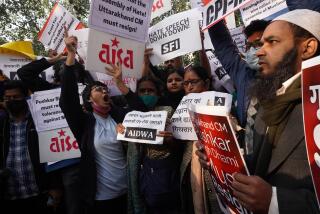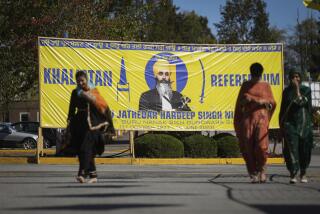India upper-caste militia leader Brahmeshwar Singh slain
- Share via
NEW DELHI — Brahmeshwar Singh, a wealthy landlord known as the “Butcher of Bihar,” was killed in a hail of bullets Friday while taking his morning walk, ending a notorious chapter in Indian history.
Singh, 67, the leader of a banned militia of upper-caste members known as Ranvir Sena, hit the headlines in the 1990s after he and fellow landlords were accused of the massacre of scores of lower-caste Dalits, or so-called untouchables, in central Bihar state.
As news of his killing spread, supporters gathered in Singh’s hometown of Arrah, yelling antigovernment slogans, burning vehicles and chasing away police who sought to recover his body for an autopsy. Authorities attempted to maintain order by imposing a curfew.
“On hearing the sound of guns, people came and saw him lying on the ground dead,” local Police Chief Ajitabh Kumar said by telephone, adding that the situation was tense but under control. “An investigation is underway. We can’t say at this point who’s responsible.”
The Sena, or “army,” was formed in 1994 by landlords who felt threatened by the state’s changing political winds, including louder calls for Dalit rights and land reform as well as a growing number of attacks on the wealthy by Maoists.
Singh, who took over the group a few months after it was formed, was suspected of planning or directly participating in as many as 29 incidents in which more than 200 Dalits were killed. In 1996, 23 were killed in a village in Bhojpur district and in 1997 about 60 were slain in the state’s Lakshmanpur Bathe area.
Little effort was made to hide the killings in Bihar, a state with a serious law-and-order problem and a centuries-old feudal structure that viewed landholders as a law unto themselves, analysts said.
The attacks “were carried out openly during the day and at night,” said Ajit Kumar Singh, a research fellow and Bihar native with New Delhi’s Institute for Conflict Management. “Sometimes victims were shot, sometimes butchered.”
Singh went underground for several years after the group was banned, but he retained significant support among Bihar’s upper caste and would periodically hold high-profile news conferences.
“He became sort of a celebrity,” said Sankarshan Thakur, an editor with the Telegraph newspaper and author of a book on Bihar’s political system. “He knew how to work the system.”
In 2002, Singh was arrested and faced life in prison on “carnage” charges. He spent nine years behind bars awaiting trial under India’s creaky legal system before being released on bail last year and subsequently acquitted for insufficient evidence.
“In the entire India, cases are dependent on witnesses,” said Chandra Bhan Prasad, a Dalit activist. “If no one says they clearly saw the killings, that’s how these guys get away.”
Local journalist Gyaneshwar, who uses one name, interviewed Singh in 1999 and described him as a natural leader with clear, forceful arguments and good organizational skills, who set up teams in which members were designated to undertake specific roles in massacres.
“He was proud and unabashed about what he was doing,” Gyaneshwar said. “Ranvir Sena was at its prime then, and he told me that within a month they will kill people.” A month later, on Feb. 9, 1999, the group killed 23 Dalits, including women and children, in Jehanabad district.
Devendra Kumar Singh, 60, a colleague of Singh’s who is not related to him, said the slain leader was inspirational, read two books a day and never lost his temper. “He was the [Mahatma] Gandhi for farmers,” he said. “A personality like his is only born once every million years.”
Gyaneshwar said his interview with Singh was cloaked in secrecy, involving a night spent in a roadside restaurant to ensure he wasn’t being followed, a three-mile walk to a hide-out and a promise not to publish anything for two days to give Singh time to move to a new location. Singh dressed in simple traditional Indian clothing, including a skirt-like dhoti, and had a simple demeanor, the journalist said.
“Indian politics is caste-dominated,” Gyaneshwar said. “The Bihar government wasn’t interested in dealing with caste issues, fearing the consequences, so it just sat on the side as mute spectators.”
Tanvi Sharma in The Times’ New Delhi bureau contributed to this report.
More to Read
Sign up for Essential California
The most important California stories and recommendations in your inbox every morning.
You may occasionally receive promotional content from the Los Angeles Times.










